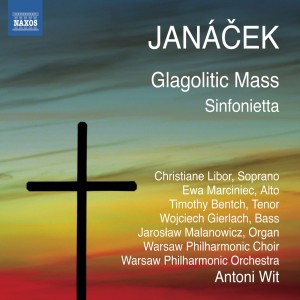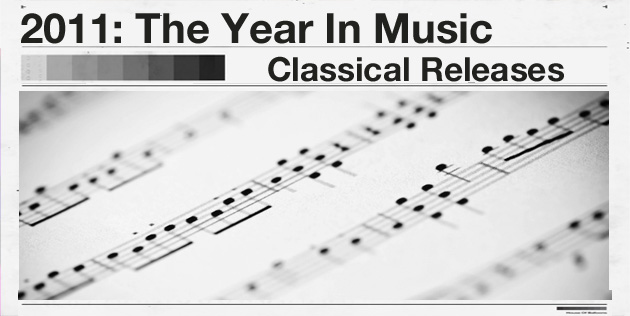Listen to One Thirty BPM’s top 20 classical releases of 2011 in this Spotify playlist.
Classical releases are as numerous as they are varied – which isn’t particularly surprising when you consider that classical listeners are one of the few groups who still go out and, you know, actually… purchase physical objects occasionally. If you think the endless culture of re-issues and deluxe box sets is bad in the popular music world, you really have no idea. With a back catalogue spanning some nine centuries and dozens of genres, major classical labels like Deutsche Grammophon, Decca, Naxos, EMI, Philips, Sony, as well as smaller ones like Hyperion and Harmonia Mundi, have plenty of music to re-record and repackage. Sadly, the classical charts are often crowded with utter, utter shit, sorry, I mean, crossover sensations. To preserve my sanity, things like The Greatest Video Game Music and Andre Rieu’s Forever Vienna will unfortunately be omitted from this list, to make way for… hmm… how can I put this delicately… real music? So this list will be even more subjective than every other end-of-year countdown, because it incorporates such a wide range of material, and also because there’s no pretence of consensus here – I’m the only person deciding on it. It’s not intended to be authoritative, or even necessarily that accurate. Personally, I try to avoid getting hung up on issues of interpretation, and I see no particular reason to have a hundred versions of the same piece of music, so this is purely a selection of a few great recordings made in the last twelve months from performers I trust, playing repertoire that I enjoy and that I think you’ll appreciate too. And if you don’t agree with me, you can always round off the year by listening to my surprisingly non-awful Classical Christmas Playlist on Spotify instead…

20.
Goldner String Quartet with Piers Lane
Elgar
[Hyperion]
Oh Elgar! England! Creamy old England! Yes, Elgar is sometimes regarded as a stuffy, conservative composer, but once you get past the patriotic anthems (or Graduation marches, if you’re American), the profound emotional qualities of his music become immediately apparent. For Elgar, music provided an outlet in a suffocating society, and this is perhaps most apparent in these intimate chamber pieces, which have been rescued from obscurity by the Goldner Quartet. Of the many releases this year which celebrate little-known corners of the classical world, this is by far the most rewarding. Elgar might have felt out of place as the twentieth century avant-garde exploded around him, but sincerity of feeling sometimes outlives wild originality.

19.
Marc-Andre Hamelin
Liszt: Piano Sonata, Fantasy and Fugue
[Hyperion]
Hamelin laughs in the face of danger. The insane, the borderline unplayable, music that would challenge a pianola – he cares very little about the difficulty of these things. He can probably play Liszt in his sleep, but his performances here are not empty virtuosity. The composer’s B Minor Sonata is one of the pinnacles of the piano repertoire, and also one of the most challenging pieces a pianist can face, in terms of both technique and expression. Hamelin’s abilities are such that he not only surmounts these challenges, but brings a rare sense of grace to the work. There have been many Liszt recordings in this anniversary year, but this one is exceptionally good. It also contains some highlights from Liszt’s epic ‘Years of Pilgrimage’ and a homage to Bach in which Liszt makes use of a famous musical cryptogram.

18.
Valery Gergiev and the London Symphony Orchestra
Mahler: Symphonies 5 & 9
[LSO Live]
Mahler doesn’t come naturally to Valery Gergiev, who also wins my coveted Classical-Haircut-of-the-Year Award, as he has worked mainly with Russian music for much of his career, but his efforts to master these huge works are nonetheless commendable. Even so, some finicky Mahler fans have been more than usually critical of his now completed cycle of symphonies. Are these criticisms justified? Of course, if you wanted to find out you could spend three weeks comparing his recordings to all the other versions by Solti, Kubelik, Bernstein, Rattle….. Oh, I’m sorry, I fell into a tedium-induced coma while writing that sentence because no one cares. NO ONE CARES! Gergiev is the man who brought Wagner’s Ring Cycle to Russia, the man who conducts with a toothpick, the man whose favourite composer is Sergei “Evil Music” Prokofiev – in other words, a maverick. Yes, maybe some of his interpretations were a little patchy at first, but if you want to hear some decent Mahler recorded this year, there’s really nothing wrong with these albums. In fact, since these have come at the end of the cycle, Gergiev seems comfortable at last. We can only hope he won’t be put off by his critics and continue this foray into non-Russian repertoire.

17.
Vasily Petrenko and the Royal Liverpool Philharmonic Orchestra
Shostakovich: Symphonies 1 & 3 / 6 & 12
[Naxos]
I’ve only recently encountered Vasily Petrenko’s outstanding Shostakovich cycle, but he’s been working on it for several years now, and he’s still not finished. But that’s fair enough, since Shostakovich was one of the most notable exceptions to the dreaded curse of the ninth, having written fifteen symphonies altogether. None of the four symphonies recorded this year previously ranked amongst my favourites, but Petrenko’s illuminating recordings are persuading me of the case for several of them, and I think that speaks volumes – anyone can introduce you to something you’re already predisposed to like, but it takes a special talent for someone to convince you to appreciate something that you didn’t think you cared about. Petrenko even brings out the best in the works that initially seem as though they were concocted merely to appease the Soviet authorities. I look forward to his recordings of the seventh and fourth symphonies in years to come.

16.
Simon Rattle and the Berlin Philharmonic Orchestra
Mahler: Symphony No.2 ‘Resurrection’
[EMI Classics]
Mahler’s second symphony is from another planet. It is impossibly good. Even the composer himself struggled to believe he had written it. Rattle is a Mahler specialist, one of the world’s leading conductors, and a stickler for detail. He’s also recorded this symphony before with his old orchestra in Birmingham (England, Not Alabama), which was a benchmark performance. This year is also the centenary of Mahler’s death, so his work has been recorded pretty extensively in recent months. The trouble with Mahler is that interpretation is everything, and this attracts a lot of a lot of pedants and tedious whining. So even though I think this album is pretty great, I’ve refrained from placing it any higher. Mainly because I’m afraid of death threats. Listening to this symphony will take you more than eighty minutes, and even if it doesn’t change your life, or at least give you a mild tingling sensation, then you have no soul.

15.
Andreas Scholl & Accademia Bizantina
O Solitude
[Decca]
Yo La Tengo’s bassist once recorded an album of Prince covers entitled That Skinny Motherfucker with the High Voice?, and that wouldn’t be too inappropriate a title for this album. Andreas Scholl is a renowned countertenor, a man who can sing comfortably in the alto range, and can thus take on parts that are normally reserved for women. In fact, if you didn’t see his face, and just heard his voice, you’d probably think it was a woman’s voice… or possibly Klaus Nomi. It can be strange and jarring at first, but the more you listen, the more remarkable and beautiful it becomes. This album is made up entirely of songs by the English baroque composer Henry Purcell, who is best known for his opera ‘Dido and Aeneas’, but Scholl demonstrates here how many of his other compositions are worth hearing. The Ode for St Cecilia’s day and the ‘Cold Song’ from King Arthur are particularly great. The Accademia Bizantina provide excellent and appropriate accompaniment – their own release of Bach sinfonias released this year is also worth hearing. And if you’re still sceptical about countertenors, just be thankful that there are no castrati anymore.

14.
Paul Lewis
Beethoven: Diabelli Variations
[Harmonia Mundi]
Paul Lewis again. Beethoven again. But it would be a crime not to include this album on this list. The perfect foil to the cycle of piano sonatas, Beethoven’s Diabelli Variations are some of the most imaginative and iconoclastic examples of this kind of composition ever written, alongside Bach’s Goldberg Variations and Brahms’ Handel Variations. Anton Diabelli was a music publisher who thought he could make a bit of money by commissioning variations on a waltz he had written and collecting them into a patriotic compilation. Beethoven, however, had other ideas, and wrote thirty two more variations than were actually required, consigning most of the other fifty composers who had been commissioned to obscurity. This isn’t an easy body of work to appreciate on first listen, but Paul Lewis’ interpretation makes Beethoven’s labyrinthine late style much more palatable than many other renditions. His long-running dedication to Beethoven pays off here, with an intimate understanding of every nuance of the composer’s style.

13.
Stephen Hough
Chopin: The Complete Waltzes
[Hyperion]
Stephen Hough doesn’t need to prove anything to anybody. Having recorded more than fifty albums, appeared in recitals, chamber music and as a soloist with orchestras all over the world and even composing his own music (an all-too-rare occurrence amongst musicians today), he has proved himself many times over as one of the outstanding pianists of his generation. So, with 2011 being the 200th anniversary of the birth of Liszt, Hough has done what any sensible person would do – recorded Chopin instead. Yes, there are plenty of box sets of Chopin’s complete piano work available, but some performers are better suited to different aspects of his output, and Hough brings some richly deserved attention to pieces which are sometimes dismissed as lacking seriousness. These waltzes are lively, utterly accessible and wonderfully played.

12.
Nicola Benedetti & the Scottish Chamber Orchestra
Italia
[Decca]
Baroque music can sometimes seem a little samey – some people even dismiss Vivaldi altogether as having written the same concerto five hundred times. They have a point – it can be difficult to know where to start when it comes to this material, as the sheer quantity of music can be daunting and outstanding pieces can get lost in a fog of sound. Thankfully, releases like this can save you the trouble of trudging through mediocre music by picking out some moments of brilliance. Thankfully, Benedetti also avoids the opposite problem – picking too many overfamiliar works, so alongside recognisable pieces like Vivaldi’s ‘Summer’ from The Four Seasons are great works by lesser-known Italian violin masters Tartini and Veracini, such as the demanding ‘Devil’s Trill’ sonata. Other familiar vocal Vivaldi pieces are given a fresh lease of life here in transcriptions for the violin, which are a pleasant surprise.

11.
Antoni Wit with the Warsaw Philharmonic Orchestra & Choir
Janáček: Glagolitic Mass / Sinfonietta
[Naxos]
Janáček, like his compatriot Dvořák before him, had plans to compose a large-scale, religious choral work. Unlike Dvořák, however, he did not have a strong faith, was not tied to a purely Czech national identity, and had no intention to write in Latin. Instead, he chose to use Old Church Slavonic, a language rooted in the East, rather than the West. The result was his Glagolitic Mass, one of the great achievements of choral music, a challenging (and incredibly loud) piece for both performers and listeners, filled with curious flourishes. Naxos consistently prove that a budget-priced recording does not mean having to compromise on quality, as all the complex solo parts of this work are brilliantly articulated. The brass-dominated Sinfonietta is also included here, and sounds varied and interesting throughout its five movements, despite the fact that they are all more or less the same tempo.


